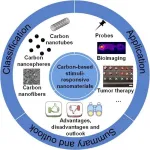(Press-News.org) Do whales increase the removal of carbon from the atmosphere?
Despite some hope that this would be the case, a new study led by Griffith University and a team of global researchers has found the amount of potential carbon capture by whales is too little to meaningfully alter the course of climate change.
Marine scientist Dr Olaf Meynecke and the team from the Griffith-led Whales and Climate Research Program including Professor Brendan Mackey and Dr Jasper De Bie, reviewed the primary ways in which baleen whales (such as humpback whales) removed atmospheric carbon at regional and global scales.
The team found the amount potentially sequestered by the whales was too minimal to make significant impact on the trajectory of climate change.
“Our study support that whales are important for the marine ecosystem, but their contribution to the global carbon flux is too small to effectively reduce atmospheric carbon,” Dr Meynecke said.
“While our research group would very much like to highlight the opposite in order to benefit the conservation of whales and perhaps one day use carbon credits to support research, the debate is misguiding and creates false hope.
“This is in contrast to media perpetuating whales as climate engineers.
“Creating false hope in the ability of charismatic species to be climate engineers may act to further delay the urgent behavioural change needed to avert catastrophic climate change impacts, which can in turn have indirect consequences for the recovery of whale populations.”
The ocean carbon cycle is a major driver of the world’s climate and further investigation on existing gaps in whale ecology will help clarify their contribution to it, stressed the team.
There are other potential pathways in which whales can contribute to carbon capture: through their biomass in which carbon is kept for decades (depending on their life span); and when a whale dies by falling to the ocean floor where it may eventually be covered by sediment.
And while whales were vital to the healthy functioning of marine ecosystems, Dr Meynecke said overstating their ability to prevent or counterbalance human-induced changes in global carbon budgets may unintentionally redirect attention from well-established methods of reducing greenhouse gases.
“Previous estimations neglect the scale in which carbon sequestration occurred both temporally and spatially. Some of the pathways suggested for carbon sequestration such as whale falls (when whales die and sink to the ocean floor but retain carbon for decades) also underestimate the breathing of whales.
"We think it is important to acknowledge that there are other values of whales that are more relevant to drive their conservation than carbon capture.
“Large scale protection of marine environments including the habitats of whales will build resilience and assist with natural carbon capture at a global scale.”
The research ‘Do whales really increase the oceanic removal of atmospheric carbon?’ has been published in Frontiers in Marine Science, Marine Megafauna.
This research was assisted by funding to the Whales and Climate Research Program.
END
Whales not to be counted on as ‘climate savers’: study
2023-06-04
ELSE PRESS RELEASES FROM THIS DATE:
New drug delays progression of glioma, a deadly brain cancer
2023-06-04
Key takeaways
A targeted therapy drug called vorasidenib had positive results in delaying progression of a specific form glioma, a slow-growing but deadly brain cancer.
In a study of 331 people with the disease, the drug was effective in lengthening the period of time before the patients’ cancer worsened, and with no observed adverse effects.
New treatment approaches for glioma are needed because current treatments, including chemotherapy and radiation, can cause neurological deficits.
In ...
University of Sydney launches innovative research fellowship scheme to tackle global challenges
2023-06-04
An unprecedented investment by the University of Sydney, Australia will support up to 40 new continuing positions, empowering the world’s most talented emerging researchers to undertake innovative research to address some of the biggest challenges of our time.
A $100 million investment and a cornerstone of the University’s 2032 Strategy, the Sydney Horizon Fellowship scheme is the first of its kind in Australia and among the most generous university fellowships in the world.
“The Sydney ...
Real-world data suggests stopping immunotherapy after two years is reasonable in patients with advanced lung cancer
2023-06-04
CHICAGO – Over the past decade, the approval of immune checkpoint inhibitors has revolutionized treatment for patients with advanced lung cancer, helping many live longer lives and improving overall survival for the disease. However, an important question has remained unanswered: How long should a patient with advanced non-small cell lung cancer (NSCLC), who receives immunotherapy as part of their initial treatment, continue with treatment?
A new retrospective cohort study, published today in JAMA Oncology and presented at the 2023 American Society of Clinical Oncology (ASCO) Annual Meeting (Abstract ...
Association of immunotherapy duration with overall survival in advanced non–small cell lung cancer – this study is being released to coincide with a poster presentation at the 2023 ASCO annual meeting
2023-06-04
About The Study: The findings of this study provide reassurance that for patients with advanced non–small cell lung cancer whose disease is still responding to immune checkpoint inhibitor therapy at two years, stopping therapy and monitoring rather than continuing immunotherapy indefinitely is a reasonable strategy with sustained clinical benefit.
Authors: Lova Sun, M.D., M.S.C.E., of the Perelman School of Medicine at the University of Pennsylvania in Philadelphia, is the corresponding author.
To access the embargoed study: Visit our For The Media website at this link https://media.jamanetwork.com/
(doi:10.1001/jamaoncol.2023.1891)
Editor’s ...
The promise of novel FolRα-targeting antibody drug conjugate in recurrent epithelial ovarian cancer
2023-06-03
Presented today by VHIO’s Ana Oaknin at the 2023 ASCO Annual Meeting, 2-6 June (Chicago, IL), updated dose expansion data of the STRO-002-GM1 global phase I study* show promise of FolRα-targeting antibody drug conjugate (ADC) luveltamab tazevibulin in patients with recurrent FolRα-expressing epithelial ovarian cancer.
80% of patients included in this study presented with FolRα expression levels higher than 25%. The overall response rate among these patients was 43.8% in the dose expansion cohort, with a median duration of response ...
Carbon-based stimuli-responsive nanomaterials: classification and application
2023-06-03
Carbon-based stimuli-responsive nanomaterials are gaining much attention due to their versatility, including disease diagnosis and treatment. They work under endogenous (pH, temperature, enzyme, and redox) or exogenous (temperature, light, magnetic field, ultrasound) stimuli. Carbon-based stimuli-responsive nanomaterials can be used as smart materials with dynamically tunable physicochemical properties in response to changes in internal or external environmental stimuli. Their diverse combinations of nanostructures and molecular designs, as well as functional ...
ASCO: Targeted therapy induces responses in HER2-amplified biliary tract cancer
2023-06-03
ABSTRACT: 4008
CHICAGO ― HER2-targeted bispecific antibody zanidatamab demonstrated durable responses in patients with treatment-refractory HER2-positive biliary tract cancer (BTC), researchers from The University of Texas MD Anderson Cancer Center reported at the 2023 American Society of Clinical Oncology (ASCO) Annual Meeting. The study results also were published today in The Lancet Oncology.
In the first cohort of the global Phase II HERIZON-BTC-01 trial, which included 80 patients with HER2-positive tumors, the confirmed objective response rate (cORR) was 41% with a median duration of response (DOR) of 12.9 months at a median follow-up of 12.4 months. ...
Children with drug-resistant epilepsy live longer after cranial surgery
2023-06-03
Survival rate beyond 10 years in children with drug-resistant epilepsy (DRE) was highest after cranial epilepsy surgery and lowest when treated only with antiseizure medications, according to a study published in The Lancet Child and Adolescent Health. This large, retrospective study was the first to compare long-term survival in children with DRE among cohorts treated with medications only, vagus nerve stimulation plus medications, and cranial epilepsy surgery plus medications. Results show that risk of early death was reduced by over 80 percent after surgery and by 40 percent after ...
Can movie reviews predict box office success?
2023-06-03
When one thinks of movie reviews, one might see them as harbingers of success or failure at the box office. Some researchers have previously found that both positive and negative reviews correlate to box office revenues, and the effect of negative reviews diminishes over time.
However, researchers at the University of California, Davis, suggest that is not the case.
Researchers analyzed pre-release commentary and opening weekend box office revenue, turning the impact of movie reviews on its head and revealing an unexpected harbinger of failure phenomenon in the movie industry.
The study, ...
For advanced, HER2-amplified bile duct cancers, antibody treatment trial shows promising results
2023-06-03
Bile duct cancers are uncommon and aggressive types of gastrointestinal cancer. They include cholangiocarcinomas, which can form inside or outside of the liver, as well as cancers of the gallbladder, and are highly likely to cause serious disease or prove fatal.
Bile duct cancers affect the biliary tract, which consists of organs and ducts that make and store bile and release it into the small intestine. They are known as “silent” cancers, because there are usually no symptoms until they reach later stages. Surgery can be effective if bile duct cancer is caught early, ...




